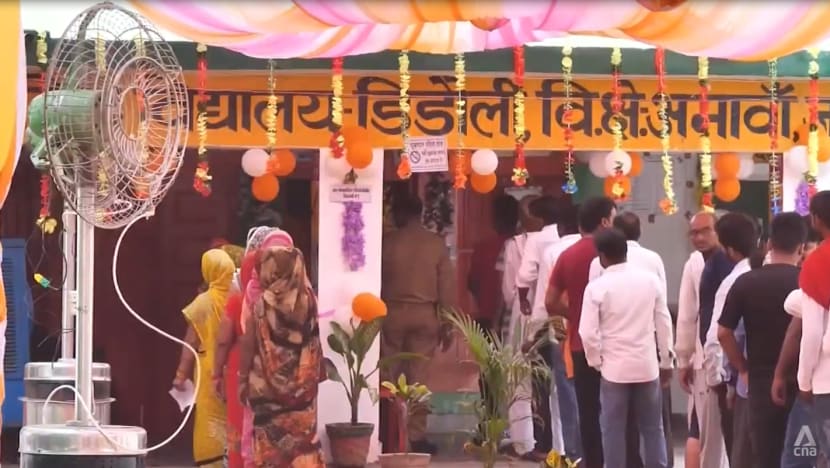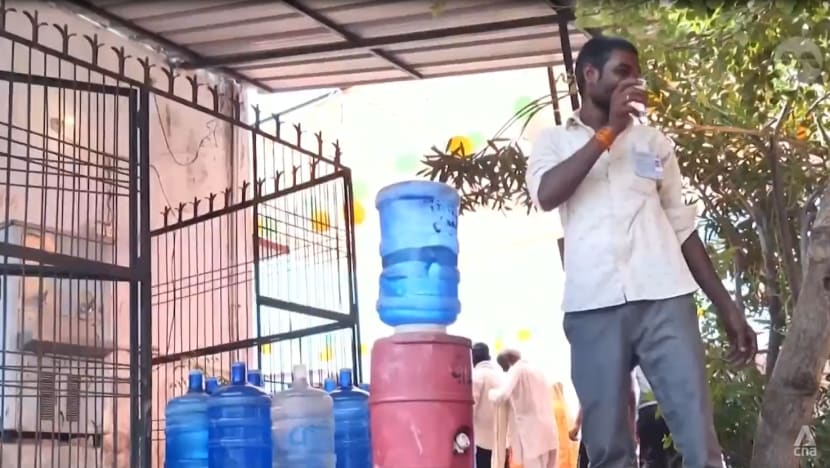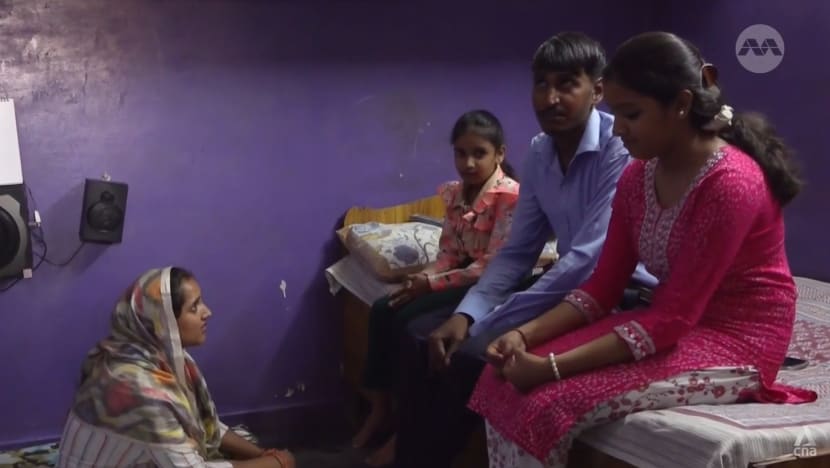Voting in 47°C weather: Experts blame low turnout on poor planning by India’s election body
Polling begins in the Indian capital of New Delhi on Saturday, with temperatures reaching as high as 47 degrees Celsius there.

A fan set up at a polling centre in India.

This audio is generated by an AI tool.
NEW DELHI: Madam Nisha Janotri and her husband have no choice but to go out in India’s searing heat to earn enough for their family.
The couple run a clothes ironing stand in South Delhi, which does not have electricity or even a fan. It is also even hotter for them due to heat from the charcoal iron they use.
“It becomes unbearable sometimes. Some days I feel weak and lightheaded,” Mdm Nisha told CNA.
“I pick up the clothes from different homes, iron them and deliver them back. It becomes very difficult in the heat.”
The mercury has soared beyond 45 degrees Celsius across the world’s most populous country, where a general election is ongoing.
In New Delhi, where voting will begin on Saturday (May 25), temperatures have hit as high as 47.4 degrees Celsius.
As the capital sizzles, authorities have issued the highest level of alert for severe heatwaves.
Meanwhile, at least nine people have died in the western state of Rajasthan due to suspected heat stroke.
India's summer temperatures often peak in May, but scientists have predicted more heatwave days than usual this year, largely caused by fewer non-monsoon thundershowers and an active but weakening El Nino weather phenomenon.
Climate experts have blamed lower voter turnout on a lack of preparation for the hot weather by India's poll body.
Experts also criticised political parties for largely keeping India's climate crisis away from their manifestos.
“IT MAKES US NOT WANT TO VOTE”
Mdm Nisha said they feel “very let down” by the current situation.
“We are voting in every election but we are not getting any benefit from any government. It is sad. It makes us not want to vote,” she added.
The first five phases of India’s ongoing election have seen a lower voter turnout compared to elections held in the summer of 2019. Extreme heat has been cited as one of the major reasons keeping voters away.
It has also prompted suggestions that India needs to start scheduling its elections before the peak summer period.
Election authorities said they are taking steps to ensure the comfort of voters, such as setting up fans and tents as well as providing drinking water.
Environmentalist Vimlendu Jha said he did not think the election commission considered the weather conditions before breaking up the election, which is already the world’s largest, into seven phases.
“The election wouldn’t have been in the middle of summer, in terms of deciding on constituencies and areas of election,” he added.
“I would say that right now, when the election commission is coming up with advisories, it is almost like an afterthought because they are caught unaware.”
CLIMATE CHANGE NOT IMPORTANT TO POLITICIANS
This year’s scorching summer did not come out of the blue.
In 2022, World Weather Attribution reported that rising global temperatures had made South Asian heatwaves 30 times more likely and warned that global warming would increase the frequency of record-breaking temperatures in India.
Despite such warnings, the issue of climate change has been missing from political speeches this election season.
Other climate calamities that have unfolded recently in various parts of the country, like forest fires, droughts, coastal erosion, flash floods, and urban flooding, have found no place in election discussions either.
Mr Jha noted that there have only been “very large philosophical, ambiguous statements” about green jobs and the climate crisis, or about the reduction of coal-burning in electricity production.
“Both parties have done a good job in greenwashing their manifestoes in terms of grandstanding on their commitment towards climate change, but nothing concrete has been mentioned,” he said, referring to the ruling Bharatiya Janata Party and the main opposition Congress party.
Observers added that India's lawmakers have still not come up with any concrete policies to tackle climate issues long-term.

MORE HEAT STROKE CASES, SCHOOLS ORDERED SHUT
For now, millions of Indians must brave record-high temperatures to cast their ballots in the final two phases of the election.
Most of the remaining polling is scheduled in north and central India, which are currently the worst affected regions. By the time the election wraps up in the first week of June, India’s weather department is forecasting longer and more intense heatwaves across the country.
In Delhi, hospitals are reporting an increase in patients suffering from heat strokes, dehydration and respiratory ailments.
Schools have been ordered shut and health experts have advised against long exposure to extreme temperatures, especially for older citizens and children.
One Delhi resident told CNA that the nighttime humidity leaves his family unable to sleep, as they cannot afford air-conditioning.
For Mdm Nisha’s husband Raju, driving their car is the only time he gets a break from the heat in the form of air-conditioning. He has a second job as a part-time driver for a wealthy family that lives opposite their ironing stand.
“We have to work for our livelihood. It is very hot, it is hot for everyone,” he said.
“If we don’t work, how will we feed ourselves, how will we feed our children?”

The couple live in a small one-room flat with their two daughters. As the heat escalates, Delhi’s power demands have skyrocketed, leading to more frequent blackouts that have impacted the family.
Mr Raju said the lights go out multiple times in the evenings for short periods, just when they get home and want to rest.
“It goes in the day too but we are away … At night, it is very problematic in the heat. Water also comes every other day,” he added.
Another resident said he has resorted to taking showers two to three times a day to beat the heat.
He added: “Here where we work, there are no air-conditioners. I have one at home but what's the point when I am out all day? The government should do something about this.”
















